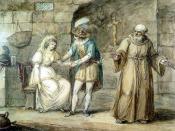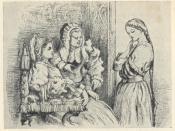What does the Roman Empire, an old forest and a zit on your nose all have in common? The Empire must split in two and be attacked by oppressed Huns for the land to be renewed. An old forest must die or have a good amount of trees die for saplings to poke up, and you must squeeze all the blood and pus out of the zit on your nose for your skin to be renewed to its beautiful potential. All of these examples must die or be otherwise altered in some way for rebirth to happen. This philosophy is something disputed among people and illustrated in the Shakespearean tragedy "Romeo and Juliet" and the Egyptian myth "Osiris and Isis" and in the quote "Someone or something must die or otherwise be transformed before society can be renewed"- the words of an African griot. These two texts not only demonstrate the idea but also prove it.
In Romeo and Juliet, the complicated and conflicting plot lays ground for the renewal after the story comes to an end. The Montague's and the Capulet's are in what seems to be a perpetual stalemate. In the middle of this conflict the love of Romeo and Juliet is born. The philosophy stated earlier is illustrated along with oxymoron in the quote "parting is such sweet sorrow" said by Juliet referring that even though leaving each other might be painful, the sooner the leave each other, the sooner the new day will come and they will see each other again. Another quote that illustrates the idea along with oxymoron is "My only love sprung out my only hate, too early seen and known too late!" Also said by Juliet, she means despite the hate of the two houses, she has fallen...



Good
nice essay! i liked the layout and the context. right to the point, but with good description. great job!
3 out of 3 people found this comment useful.